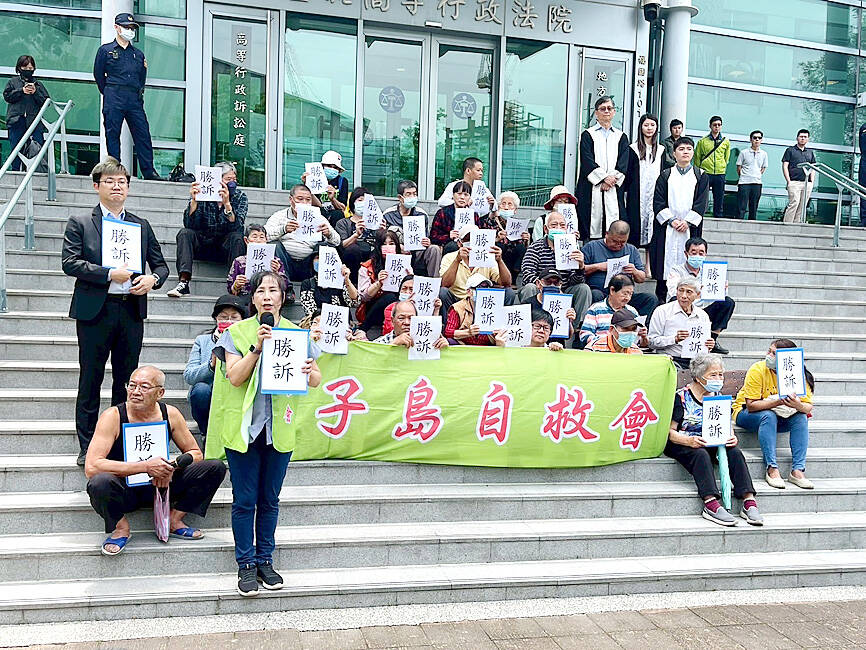The Taipei High Administrative Court yesterday ruled in favor of residents of Shezidao (社子島) in Taipei’s Shilin District (士林), saying that the environmental impact assessment (EIA) results for the development of the peninsula should be revoked.
Shezidao, an alluvial plain at the confluence of the Tamsui (淡水河) and Keelung (基隆河) rivers, has become a center of debate since the Taipei City Government on Jan. 19, 2022, approved the EIA report on the peninsula’s development project.
The Shezidao Self-help Association filed an administrative lawsuit against the city government the same year, arguing that the EIA results were passed despite significant flaws in the assessment approach.

Photo courtesy of the Shezidao Self-help Association
FLAWED ASSESSMENT
The court in the ruling said that the assessment results were illegal for three reasons.
First, the wastewater treatment plant to be built in Shezidao was not included in the EIA, the ruling said.
The plant would be used to treat not only the project’s construction sewage, but also household sewage after the project’s residential buildings are built, it said.
As household sewage is projected to reach 35,000 tonnes per day and would be discharged into the project’s central river channel after treatment, the plant is crucial to the project’s flood control plan and should be included in the assessment, the ruling said.
Second, the assessment failed to evaluate embankment facilities, which would aid the central river channel in drainage and flood control, it said.
Third, it failed to submit a wetland impact report as required by Article 27 of the Wetland Conservation Act (濕地保育法), the ruling said.
Given that the evaluation of embankment facilities was excluded from the assessment, the Ministry of the Interior, the central wetland authority, was misled into concluding that the project would not involve national wetlands around the Tamsui River and did not require the city government to conduct a wetland impact assessment, it said.
Association spokeswoman Li Hua-ping (李華萍) yesterday told a news conference that local residents do not oppose the development of Shezidao.
However, they oppose the city government’s “zone expropriation” plan, in which their residences would be destroyed and they would be forced to leave, she said, calling on Taipei Mayor Chiang Wan-an (蔣萬安) to suspend the project.
Association attorney Kuo Hung-yi (郭鴻儀) said the city government should listen to local residents’ opinions and shift to a bottom-up approach in planning Shezidao’s development and preserve the cultural heritage of local communities.
The city government has budgeted up to NT$130 billion (US$4 billion) for Shezidao’s development, he said, calling on the city government not to use such a huge amount of money to expel the peninsula’s residents to benefit particular groups.

Taiwan has received more than US$70 million in royalties as of the end of last year from developing the F-16V jet as countries worldwide purchase or upgrade to this popular model, government and military officials said on Saturday. Taiwan funded the development of the F-16V jet and ended up the sole investor as other countries withdrew from the program. Now the F-16V is increasingly popular and countries must pay Taiwan a percentage in royalties when they purchase new F-16V aircraft or upgrade older F-16 models. The next five years are expected to be the peak for these royalties, with Taiwan potentially earning

STAY IN YOUR LANE: As the US and Israel attack Iran, the ministry has warned China not to overstep by including Taiwanese citizens in its evacuation orders The Ministry of Foreign Affairs (MOFA) yesterday rebuked a statement by China’s embassy in Israel that it would evacuate Taiwanese holders of Chinese travel documents from Israel amid the latter’s escalating conflict with Iran. Tensions have risen across the Middle East in the wake of US and Israeli airstrikes on Iran beginning Saturday. China subsequently issued an evacuation notice for its citizens. In a news release, the Chinese embassy in Israel said holders of “Taiwan compatriot permits (台胞證)” issued to Taiwanese nationals by Chinese authorities for travel to China — could register for evacuation to Egypt. In Taipei, the ministry yesterday said Taiwan

Taiwan is awaiting official notification from the US regarding the status of the Agreement on Reciprocal Trade (ART) after the US Supreme Court ruled US President Donald Trump's global tariffs unconstitutional. Speaking to reporters before a legislative hearing today, Premier Cho Jung-tai (卓榮泰) said that Taiwan's negotiation team remains focused on ensuring that the bilateral trade deal remains intact despite the legal challenge to Trump's tariff policy. "The US has pledged to notify its trade partners once the subsequent administrative and legal processes are finalized, and that certainly includes Taiwan," Cho said when asked about opposition parties’ doubts that the ART was

If China chose to invade Taiwan tomorrow, it would only have to sever three undersea fiber-optic cable clusters to cause a data blackout, Jason Hsu (許毓仁), a senior fellow at the Hudson Institute and former Chinese Nationalist Party (KMT) legislator, told a US security panel yesterday. In a Taiwan contingency, cable disruption would be one of the earliest preinvasion actions and the signal that escalation had begun, he said, adding that Taiwan’s current cable repair capabilities are insufficient. The US-China Economic and Security Review Commission (USCC) yesterday held a hearing on US-China Competition Under the Sea, with Hsu speaking on